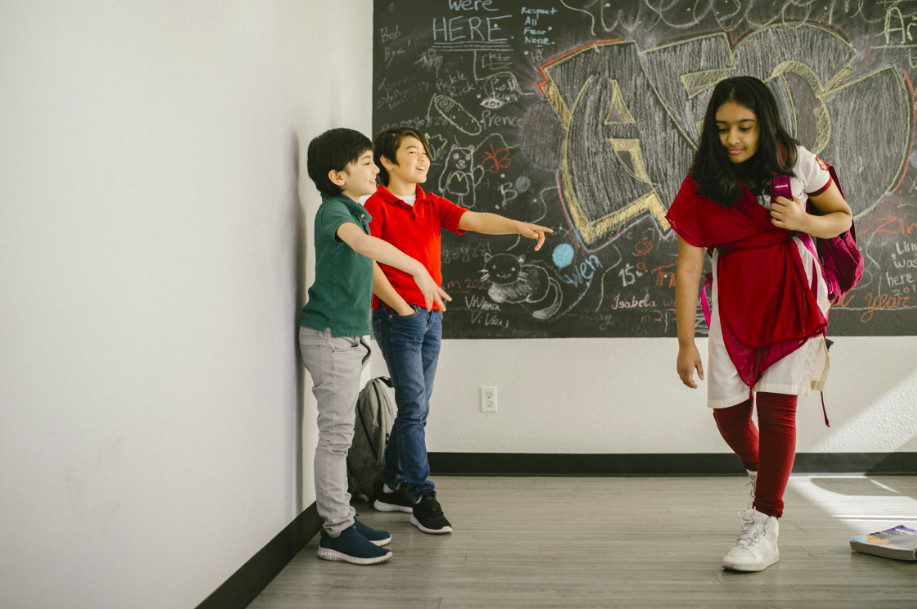It is ingrained deep in our minds that some other persons’ child is the bully and not ours. This is true even when close friends warn us about the possibility. Sometimes it is the 6th sense in us sending the signals!
Sadly, we ignore the signs and feign ignorance most of the time. It is only after matters go terribly wrong that we begin to pay attention. Then follows the excuses, soul searching, and regrets.
It shouldn’t happen that way though. We don’t have to wait until someone’s child is badly hurt or takes their life.
The time to act is now.
How then do you know your child is the bully?

Fortunately, you can read into a few tell-tale signs of bullying to help stem the monster growing in your child!
A reminder though not every sign explained below points to a bully. Some could be indicators of other social-economic problems. These too need addressing.
1. Your child lacks empathy
The ability to sense and appreciate how others feel emotionally, and the desire to make them feel better when they are hurt is what is called empathy. We understand better how others feel when we put ourselves in their shoes, especially in the face of ridicule, insult, and physical abuse. This way, we learn not to hurt their feelings, because we understand how it feels.
Empathy is important in the 21st century because of the unmistakable influence of technology on parents, and children in particular.
The excess time children spend online translates to less time they interact with real people, and therefore limited time to put themselves in other peoples’ shoes.
Excess indulgence in technology generally means they have less time to develop emotions, compassion, and self-awareness. This translates to little time they get to understand how empathy works.
According to Psychology Today,
More time on technology means less time with your own thoughts and feelings, the beating heart of mindfulness. As tech dependency increases, kids live in a state of self-alienation, estranged from their emotional selves, disabling self-awareness and self-reflection. Instead of thoughtful choices, they grow more reactive and less reflective.
Children who are emotionally absent, less reflective, and reactive are more likely to accept bullying as normal, especially when the seed of bullying exists in their cycle.
As a parent, appreciate the importance of empathy, become attentive, learn, and ensure your child respects the feelings of others.
2. Your child courts violence
Besides lacking empathy, there is the likelihood your child actually perpetrates violence.
This is evident when your child is aggressive towards younger and older siblings, and you, the parent. The aggressions may likely lead to destruction of property, as the child seeks alternative avenues to vent anger.
This attitude can be extended to everyone else out of the home, including teachers and extended family members. Your child may also perpetrate verbal aggression, through lashing out at other kids, siblings, teachers, and even you.
While the aggression may start small, it quickly builds up to uncontrollable levels and becomes a permanent feature in his life.
Usually, children become violent when parents and caregivers are violent.
Children living in homes with violence between their parents are at a greater risk of themselves displaying violent, aggressive and bullying behaviours outside the home (see Hong and Espelage, 2012, for a review). Other research points to the level of physical aggression between siblings – the most common form of family violence – as influencing bullying behaviour (Ensor, Marks, Jacobs, & Hughes, 2010).
Children who bully at school
3. Your child is always in trouble
If you are always invited to explain your child’s extreme behavior at school, chances are your child is a trouble maker and probably a bully.
Bullies find it hard to sit still and follow the rules. They often inciting other children to cause trouble.
Usually, your child will perpetuate some of these traits at school:
- Cause classroom disruptions
- Hit and push other students out of the way
- Ignore teachers’ requests to listen, or stop talking
By causing trouble, they get to lure others into bullying, and probably make new friends.
Though bullies may appear to have friends, they find it hard to create true friends, and will resort to incitement and aggression when they are turned down.
4. Your child has unexplained new acquisitions
When your child comes home with unexplained money and property such as clothing, toys, and books, they may be participating in bullying at school.
It is more than likely your child grabs stuff from those he bullies.
Ensure you understand where new acquisitions come from, and have them returned to their rightful owners.
You should be concerned if the habit continues even after your intervention. It is likely your child demands property he does not have.
5. Your child craves popularity
Every child craves popularity at school and at home, and will feel inadequate if the fame is not forthcoming. Often times, the desire to be popular is driven by parenting howlers that promote self entitlement.
Your self entitled child feels he is more important than his peers and will want every one to think so, even if it means using bullying as a ploy.
While many children will find better ways to earn this popularity, some will go the extra mile to make it happen, i.e., by joining popular groups.
Unknown or known to the new entrants is that most groups in schools and communities are usually marked by bullying.
In order to remain popular at school, child groups are known to talk mean to others and derive pleasure in embarrassing their victims. Just as well, they discriminate, grab property, and beat up other children.
6. Your child likes violent movies & video games
While violent movies and games may seem superficial when done passively on a computer screen and gaming consoles, they actually instill violence and aggressiveness in your child.
Popular video games and movies promote killings, substance abuse, foul language, obscenity, criminality, sexual exploitation, and discrimination, all of which feature in the workbook of bullying.
The American Psychological Association claims that violent video games are a risk factor in accelerating aggressiveness in children:
The research demonstrates a consistent relation between violent video game use and increases in aggressive behaviour, aggressive cognitions and aggressive affect, and decreases in pro-social behaviour, empathy and sensitivity to aggression.
Other tell-tale signs your child is a bully
Besides the pointers described above, you may also want to consider the following possibilities, which highlight bullying in your child:
Your child,
- does not want to accept responsibility for mistakes he has done
- is secretive about online activities, which likely include online bullying
- discriminates against others because of race, social status, intelligence, etc
- has behavioral problems and is withdrawing from you
- lives in a violent home, indicating you or other family members are violent
- has violent friends
- hurts animals – kicks dogs, cats, and exterminates any other minor biological lives
What you should know about bullying!
Not every child who displays the traits mentioned above is a bully. However, you should pay particular attention when your child repeats them, and your interventions don’t seem to bear fruits!
Unlike the occasional bursts-ups and disagreements your child may have with peers, the actual bullying is repetitive and gets worse with years.
Bullying happens when a child is repeatedly mean and constantly hurts others through emotional and physical abuse. These include teasing, utterances of mean things, telling lies, excluding others from activities, grabbing of property and assault.
Also true, the traits mentioned above may happen due to substance abuse or depression, and boredom. These too need your attention.
At the end of the day, bullying can lead to extreme emotional and physical pain, and the bullied children can live with the consequences forever. It is your responsibility as a parent to ensure this does not happen to your child or anyone’s child!





Leave a Reply